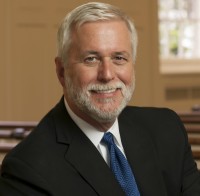Beginning to learn to be a pastor
Shortly after his ordination, a home visit unexpectedly throws a new pastor in the deep end.

Forty-three years ago, I had just been ordained as an assistant pastor when Mr. Jenkins, a trustee of the congregation, asked me to visit him at his home. I assumed he wanted to get to know his congregation’s new youth pastor. I was 26 years old, and I’d graduated from seminary only a month earlier.
I arrived at the house to find that I was meeting with Mr. and Mrs. Jenkins, their 18-year-old son, Todd, his 17-year-old girlfriend, Jennifer, and her mother, Mrs. Enright. I walked into a living room filled with tension. Todd and Jennifer were holding hands and looking down at the floor. Mrs. Jenkins was wiping away tears.
Read our latest issue or browse back issues.
As soon as I sat in my designated seat, Mr. Jenkins said, “Reverend, I’m sure you’re busy so I’ll get right to the point. Our son has got this young lady pregnant. We’ve all talked about this, and we’ve decided the kids should get married. They’re obviously very young, but we’ll all help raise this baby. The details have all been worked out. All we really need to know is if you’ll perform this wedding. I’m sure you will want to . . .”
Mrs. Enright angrily interrupted: “We have not all agreed! That is just your opinion. I think this idea of a baby is a mistake, and Jenny shouldn’t even be carrying it still. Pastor, tell him that these kids shouldn’t wreck their lives over a youthful indiscretion.”
I will never forget a word of this staggering conversation. I want to believe that I immediately entered into internal prayer while I started to respond, but I’m not sure I knew how to do that yet. I remember that I asked Todd and Jennifer how they were feeling about this, and I remember the very long silence that followed.
Eventually Todd said, “I don’t know what I’m feeling. I just want to do the right thing.” Jennifer looked up and asked me, “What do you think we should do?” There was another long silence.
I didn’t realize it at the time, but this was when I began to learn that pastors need to develop the skill of digging around to discover subtext. My seminary taught me a great deal about how to exegete the Bible and the Christian tradition, but nothing about how to exegete the congregation I had just vowed to serve with “energy, intelligence, imagination, and love.”
It is now clear to me that there were many dynamics lying beneath this tense moment in the Jenkinses’ living room. I should have started asking myself some of these questions:
Why did Mr. Jenkins ask the rookie pastor to handle this complex pastoral concern?
What did it say about the Jenkins family dynamic that the father was running the show?
Why wasn’t Mrs. Jenkins speaking?
What was the nature of Mrs. Enright’s relationship with Jennifer?
Was there a Mr. Enright? And what did it mean if there wasn’t?
Who were Todd and Jennifer, and what was their maturity level?
Why did Mr. Jenkins insist that this young couple marry and have the baby?
Why did Mrs. Enright want the opposite just as desperately?
How would we make our way through the complex issues of abortion or adoption or a young marriage?
And most importantly, what was going on here theologically?
At least I stumbled into the right strategy of slowing down the conversation. I made it clear that while I understood they were concerned about making a decision, we had some time to sort through the complicated choices before them with some care. This didn’t make Mr. Jenkins very happy with me, and I assumed he would soon be on the phone with the senior pastor about his disappointment. But it did seem to provide some relief to Todd and Jennifer.
A series of conversations followed: between the senior pastor and me, between Todd and Jennifer and me, between Todd and Jennifer and a counselor I found, and between the parents and me. After several weeks, a lot of answers to questions I didn’t even know to ask started to surface.
In the end, I told Todd and Jennifer that as their pastor I would do the wedding if that was their choice and if Jennifer, as a minor, had her mother’s permission. But I also told them that regardless of their decision about the baby, I thought that getting married was a mistake. Then I backed up to let them make their own decision. I wouldn’t have come to that position without the help of the senior pastor (who, by the way, refused to step in and take this mess off my hands, in spite of my pleading).
It’s striking to me that my pastoral ministry began with those three incredibly thick weeks. I didn’t sleep much in those days, and I constantly brooded over the intense family dynamics into which I had been tossed. But as I look back on that experience now, I realize there was also something intense forming in me.
My own soul was beginning its transformation into that of a pastor. It wasn’t exactly a painful change, but it did turn a lot of things upside down in me. As one who had spent a lot of years in school, I had to learn there was no way I was going to get an A on this. Those days were forever gone.
I also had to discover that if I tried to move the situation in a particular direction, I would essentially turn into either Mr. Jenkins or Mrs. Enright. I knew I was called to something holier in their lives than being right. This was the first time in my life that being right was not the right thing to be. It was actually beside the point of my calling. At the same time, when I did form a conviction about their situation, it would have been dishonest not to offer it as a pastor.
Perhaps most importantly, I was just beginning to learn how to bring messiness into my own tidy and uncrowded soul. This teen pregnancy, and all the complicated family dynamics swirling around it, was not a puzzle to be figured out in my mind. It was a pathos that I was called to bring into my deepest encounters with God. My brooding had to turn into prayer. My confusion had to become humility. My theology had to be pushed through real-life drama. My tendency to be careful could not prevent me from eventually taking a position. And a parishioner’s efforts to manipulate me meant I had to learn how to disappoint people who would be very unhappy with me.
Of course, little of this occurred to me at the time. I was mostly just reacting the best I could as I tried to find as much help as possible.
If I could travel back in time to have a conversation with that 26-year-old rookie pastor, I’d reassure him that while this is only the beginning of pastoral formation in him, and while it certainly isn’t going to get any easier, he will find that opening his soul to human messiness is a way of encountering holiness. And even though he’ll never get used to it, he will come to love it.
All this came back to me recently after I got home from a disastrous committee meeting and began to flip through the mail on our kitchen table. I found a card from Todd and Jennifer that contained a family picture with their twins and several squirming grandchildren.
I was wrong in my considered conviction that their marriage would never last. Right. That happens a lot.
This article is excerpted from Diary of a Pastor’s Soul by M. Craig Barnes, which combines personal experience with fictionalized narrative, © 2020. Used by permission of Baker Publishing. A version of this article appears in the print edition under the title “From panic to prayer.”







